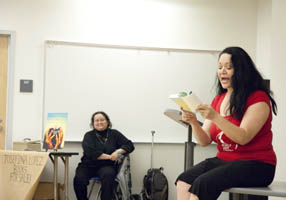Josefina Lopez spoke about her experiences as an award-winning Chicana writer, producer, actress and lecturer to a Chicano and Latino studies class at Cal State Long Beach on Monday.
Lopez is best known for “Real Women Have Curves,” a play she wrote, later co-authoring the 2002 film starring America Ferrera.
Antonia Garcia-Orozco, a CSULB Chicano and Latino studies professor, said she invited Lopez to her “Latinas in the U.S.” class because of Lopez’s success as a Chicana playwright and because her work tends to speak to students about the issues they care about.
“She is a fantastic role model,” Garcia-Orozco said.
Lopez has received numerous awards for her work, including recognition at Sen. Barbara Boxer’s annual Women Making History Banquet, a screenwriting fellowship from the California Arts Council and the Mujeres Destacadas Award from La Opinion. Along with “Real Women Have Curves” co-author George LaVoo, she has won the Humanitas Prize for Screenwriting and the Gabriel Garcia Marquez Award.
Lopez read her favorite passages from “Hungry Women in Paris,” a book she wrote after moving to France for 18 months after she grew tired of her Hollywood career and was disappointed with the re-election of George W. Bush.
“I just wanted to leave because I was upset,” Lopez said.
Once in France, she found the differences between French and U.S. immigration as distinct and interesting.
“It’s a lot easier to get citizenship in the U.S. than in France,” Lopez said.
The book speaks about the immigration issues Lopez found in France. Canela, the book’s main character, moves to France after her family gets upset when she calls off her engagement. Canela’s experiences and thoughts reflect Lopez’s own while living in France.
According to Lopez, one of the main differences between immigration in the U.S. and France is that people who are actually born in France do not get automatic citizenship and must apply for it upon turning 18.
“It’s like they are on probation for their citizenship for 18 years,” Lopez said.
Lopez also said talked about the French youth riots that occurred a few years ago and how the French do not see themselves as racist, but that they are not respectful of the ideas of other cultures.
“France is going through an identity crisis,” Lopez said.
Lopez is now living in Los Angeles, but is working on obtaining her French citizenship.
Lopez was 5 years old when her family moved from Mexico to California. She did not receive her residency until amnesty was granted in 1986 shortly before she finished high school.
Lopez talked about how her sister could not fund her college education because of her immigration status and her own struggles with financing her education.
“I couldn’t get financial aid,” Lopez said. “I had to forge my father’s signature to get a loan.”
Lopez also addressed AB 540 students and encouraged them to continue their education despite the hardships.
“You gotta do what you gotta do,” Lopez said.
Lopez started out as an actress in 1987, but her experience made her realize that Chicana and Latina actresses did not have good opportunities to make it in Hollywood without having to compromise a major part of themselves.
“No one was giving me opportunities or producing my plays,” Lopez said.
In response, she founded Casa 0101 Theater Art Space in Boyle Heights, a school where screenwriting, filmmaking and arts are taught.
“I created Casa 0101 in order to create opportunities for other people and to workshop my plays,” Lopez said.
Jessica Diaz, a senior Chicano and Latino Studies major, was excited when her professor announced that Lopez was going to speak to the class.
“She’s a wonderful writer,” Diaz said. “She writes in a very explicit way, a funny way and a very educational way.”
Noemi Padilla, a senior political science major, saw an advertisement for the event in the Daily Forty-Niner and decided to attend.
“She was very funny and down to earth,” Padilla said.
Padilla also attended because she wanted to meet the writer behind one of her favorite movies.
“The portrayal of Chicano women in the movie was very real,” Padilla said.




